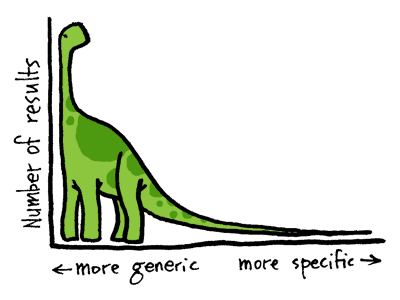Easier/Cheaper Rankings
Long tail Keywords (usually three or four words) tend to be a lot easier to rank for than more specific single or double keyword phrases. If you were to try and rank for the keyword Adventure for example, you would find that the first page on Google is taken up by big companies like Wikipedia and National Geographic. It would be almost impossible for any small businesses to appear on the first page of Google’s results for this keyword. If however you tried to rank for Quad Biking Holidays Scotland there is a very good chance that a small company would be able to reach the top of Google’s search results for that term.
Long tail keywords are also more affordable in a Google AdWords campaign. The term Adventure would likely be prohibitively expensive for a small company, whereas Quad biking Holidays Scotland would be affordable. There are other benefits to using long tail keywords too.
Higher Sales Conversions
Long tail keywords are phrases which are very specific to what you are selling. When a potential customer uses the phrase Quad biking Holidays Scotland there is a good chance that they are planning on spending money on precisely that. Someone searching only for Adventure is much less likely to be a potential customer. Specific searches are far more likely to convert to sales than general generic searches
More Content
Roughly seventy percent of page views are the direct result of long-tailed keywords, so instead of focusing on just two or three highly competitive single or double keywords, it makes sense to target dozens or even hundreds of easy-to-rank-for long tail keywords. Creating pages in your website that target these long tail keywords also makes sense. This means you’ll likely be creating more pages and Google likes sites that have lots of content. It makes your site look more substantial, more natural, and more helpful.
Tools /How To Find The Best Long Tail Keywords
The Google Adwords keyword tool is a good place to start your keyword research. It not only suggests keywords and provides estimated search volume, but also predicts the cost of running paid campaigns for these terms.
The long tail keywords you choose should be relevant to your website’s content. Try to think what potential customers are likely to type into google’s search engine. Write down as many phrases as you can think of, then search for them yourself. Check out the competition, look at other adword campaigns. When you think you have the right combination of words you could buy a sample campaign from Google AdWords and look at the results of the campaign to get an idea of how effective your long tail keyword was.



